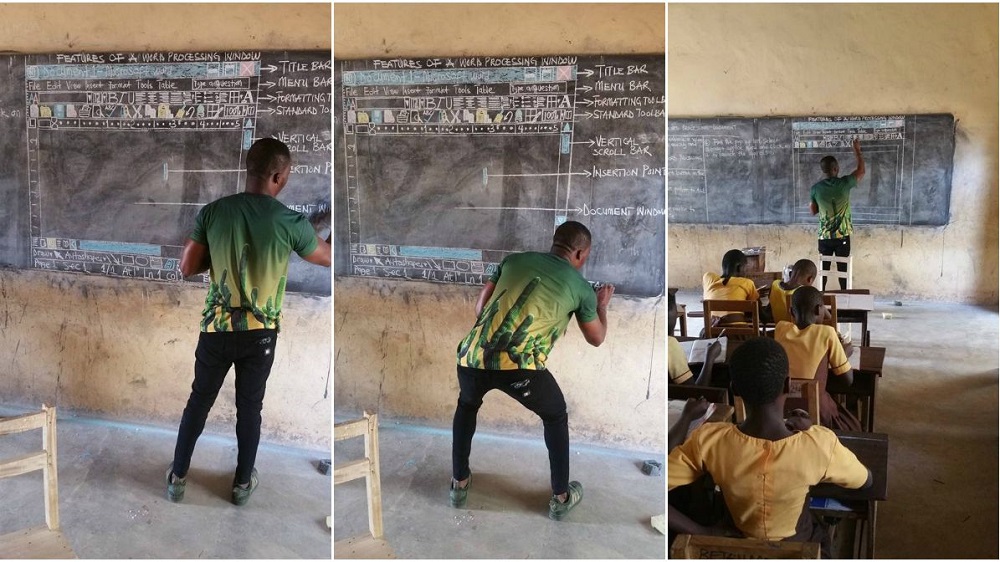
It’s been a while since I’ve seen the chalk and blackboard used for educating students in using computers. Perhaps since my last days in college where we still used IBX PC AT computers. Kind of betrays my age, doesn’t it? Today, blackboards are no longer a thing in most developed countries.
I still see the chalk and blackboard used for elementary school education for other subjects, in cities and mostly in rural areas. But as far as I know, whiteboards and markers are now just supporting tools used in computer education. The best schools probably use Microsoft’s Surface Hub in combination with tablets and laptops per student. Others use projectors and Powerpoint presentations and the occasional video. Schools in the US have been providing one PC per student since the 80s using Apples IIs. Many underdeveloped nations do not have that luxury. In college, my classmates quickly call dibs on the limited number of PCs available and organize themselves into groups.
I had no such problem as I had a more advanced PC at home (with an 80286 processor and additional 1MB of RAM), and by the time I get to school, I only needed to present my work. But an amazing schoolteacher in Ghana had no such luxury. No available computers, and no whiteboard and he has to teach computer subjects. He just has his blackboard and chalk to masterfully draw computer screens earning the awe, interest, and attention of his students. With Microsoft trying to get into the education market (with Windows 10S), this caught their attention.
“I love ma students so I have to do what will make them understand wat am teaching…I wanted to teach them how to launch Microsoft Word. But I had no computer to show them… I had to do my best. So I decided to draw what the screen looks like on the blackboard with chalk.”
— Richard Appiah Akoto, Computer Teacher, Betanase Municipal Assembly Junior High, Ghana
Well, their school used to have a computer for their computer subject, but it was broken and so was Richard’s laptop. I can’t help but admire this guy as he tries to MacGyver his way to teaching his students with the only tools available. His task would probably be easier armed with a whiteboard and marker. But those are just supporting tools even I use when teaching basic computing to field workers. I scribble rough images to support my Powerpoint slides like most teachers probably do. But Akoto draws everything, from the monitor, system units right down to app screens with formatting and drawing toolbars.
What he does is all well and good but without actual application, true learning can be difficult, and this is where Microsoft comes in. Microsoft decided to give them device and software support. They flew Akoto to Singapore to attend their Education Exchange conference of computer educators where he described his situation.
“…They have some knowledge about computers, but they don’t know how to actually operate one.”
— Richard Appiah Akoto
Aside from the device and software support for the school, Akoto will be going through Microsoft’s Educator Support Program. Akoto’s situation truly brings to light the problem of computer education in underdeveloped countries. The same probably goes for the more rural areas of developed nations that don’t get the same funding as their urban counterparts. It’s strange to think how we complain about minute lags in our internet bandwidth while others don’t even have a mouse to play with. No, we’re not playing the guilt card here, just describing something that’s off our radar.
With a little money, Akoto and his students would probably love a Raspberry Pi package connected to an inexpensive LCD TV. Older Pi’s can connect to older CRT TV’s too. Aside from Microsoft, this is a good opportunity for Eben Upton’s Raspberry Pi Foundation whose goal was to bring computer education to the masses and teach young kids to code. I’d probably go for Microsoft’s package of basic laptops with Windows 10S when given the opportunity, though the Raspberry Pi would be more sustainable in case Microsoft loses interest.
Akoto’s situation brings me back to college. Things would probably be different if my mom didn’t reward me with a PC after graduating from high school. My non-assertive self probably wouldn’t have been able to get dibs to any of the old IBM PC AT’s where you still had to switch 5.25” floppies with no C-drive to speak off, and I wouldn’t be sharing this story with you.

